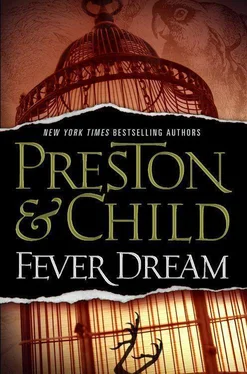Douglas Child - Fever Dream
Здесь есть возможность читать онлайн «Douglas Child - Fever Dream» весь текст электронной книги совершенно бесплатно (целиком полную версию без сокращений). В некоторых случаях можно слушать аудио, скачать через торрент в формате fb2 и присутствует краткое содержание. Жанр: Триллер, на английском языке. Описание произведения, (предисловие) а так же отзывы посетителей доступны на портале библиотеки ЛибКат.
- Название:Fever Dream
- Автор:
- Жанр:
- Год:неизвестен
- ISBN:нет данных
- Рейтинг книги:3 / 5. Голосов: 1
-
Избранное:Добавить в избранное
- Отзывы:
-
Ваша оценка:
- 60
- 1
- 2
- 3
- 4
- 5
Fever Dream: краткое содержание, описание и аннотация
Предлагаем к чтению аннотацию, описание, краткое содержание или предисловие (зависит от того, что написал сам автор книги «Fever Dream»). Если вы не нашли необходимую информацию о книге — напишите в комментариях, мы постараемся отыскать её.
Fever Dream — читать онлайн бесплатно полную книгу (весь текст) целиком
Ниже представлен текст книги, разбитый по страницам. Система сохранения места последней прочитанной страницы, позволяет с удобством читать онлайн бесплатно книгу «Fever Dream», без необходимости каждый раз заново искать на чём Вы остановились. Поставьте закладку, и сможете в любой момент перейти на страницу, на которой закончили чтение.
Интервал:
Закладка:
D'Agosta took a sip of the tea, wishing it was a Bud. "Seems like a no-brainer to me. The painting was of the Carolina Parakeet."
"Your reasoning, Vincent?"
"That's why she stole the birds from Oakley Plantation. To trace--or, more likely, identify --the painting."
"The logic is faulty. Why steal the birds? Simply observing a specimen would be sufficient."
"Not if you're in competition, it wouldn't," D'Agosta said. "Others wanted the painting, too. In a high-stakes game, any edge you can give yourself--or deny others--you're gonna grab. In fact, that just might point to who mur--" But here he stopped abruptly, unwilling to voice this new speculation aloud.
Pendergast's penetrating glance showed he had divined his meaning. "With this painting, we just might have something that so far has escaped us." And here his voice dropped to almost a whisper. "Motive."
The room went quiet.
At last, Pendergast stirred. "Let us not get ahead of ourselves." He opened the portfolio again, withdrew another tattered scrap of paper. "I also recovered this, part of what is apparently Audubon's discharge report. Again, it is a mere fragment." ... was discharged from care on the fourteenth day of November, 1821. On his departure he gave a painting, only just completed, to Dr. Torgensson, director of Meuse St. Claire, in gratitude for nursing him back to health. A small group of doctors and patients attended the discharge and many farewells were...
Pendergast dropped the fragment back into the portfolio and closed it with an air of finality.
"Any idea where the painting is now?" D'Agosta asked.
"The doctor retired to Port Royal, which will be my next stop." He paused. "There is one other item of at least tangential interest. Do you recall Helen's brother, Judson, mentioning that Helen once took a trip to New Madrid, Missouri?"
"Yes."
"New Madrid was the site of a very powerful earthquake in 1812, greater than eight point zero on the Richter scale--so powerful that it created a series of new lakes and changed the course of the Mississippi River. Approximately half the town was destroyed. There is one other salient fact."
"And that is--?"
"John James Audubon was in New Madrid at the time of the earthquake."
D'Agosta sat back in his chair. "Meaning?"
Pendergast spread his hands. "Coincidence? Perhaps."
"I've been trying to find out more about Audubon," said D'Agosta, "but to tell the truth I was never a good student. What do you know about him?"
"Now, a great deal. Let me give you a precis." Pendergast paused, composing his thoughts. "Audubon was the illegitimate son of a French sea captain and his mistress. Born in Haiti, he was raised in France by his stepmother and sent to America at the age of eighteen to escape conscription in Napoleon's army. He lived near Philadelphia, where he took an interest in studying and drawing birds and married a local girl, Lucy Bakewell. They moved to the Kentucky frontier where he set up a store, but he spent most of his time collecting, dissecting, stuffing, and mounting birds. He drew and painted them as a hobby, but his early work was weak and tentative, and his sketches--many of which survive--were as lifeless as the dead birds he was drawing.
"Audubon proved to be an indifferent businessman, and in 1820, when his shop went bankrupt, he moved his family to a shabby Creole cottage on Dauphine Street, New Orleans, where they lived in penury."
"Dauphine Street," murmured D'Agosta. "So that's how he got to know your family?"
"Yes. He was a charming fellow, dashing, handsome, a superb shot and expert swordsman. He and my great-great-grandfather Boethius became friends and often went shooting together. In early 1821, Audubon fell gravely ill--so ill he had to be taken by horse-drawn cart, comatose, to Meuse St. Claire. There he had a long convalescence. As you already know, during his recovery he painted the work called the Black Frame, subject unknown.
"When he recovered, still flat broke, Audubon suddenly conceived the idea to depict America's entire avifauna in life size--every bird species in the country--compiled into a grand work of natural history. While Lucy supported the family as a tutor, Audubon traipsed off with his gun and a box of artist's colors and paper. He hired an assistant and floated down the Mississippi. He painted hundreds of birds, creating brilliantly vibrant portraits of them in their native settings--something that had never been done before."
Pendergast took a sip of tea, then continued. "In 1826, he went to England, where he found a printer to make copper-plate engravings from his watercolors. Then he crisscrossed America and Europe, finding subscribers for the book that would ultimately become The Birds of America . The last print was struck in 1838, by which time Audubon had achieved great fame. A few years later, he began work on another highly ambitious project, The Viviparous Quadrupeds of North America . But his mind began to fail, and the book had to be completed by his sons. The poor man suffered a hideous mental decline and spent his last years in raving madness, dying at sixty-five in New York City."
D'Agosta gave a low whistle. "Interesting story."
"Indeed."
"And nobody has any idea what became of the Black Frame?"
Pendergast shook his head. "It's the Holy Grail of Audubon researchers, it seems. I'll visit Arne Torgensson's house tomorrow. It's an easy drive, a few miles west of Port Allen. I hope to pick up the trail of the painting from there."
"But based on the dates you've mentioned, you believe--" D'Agosta stopped, searching for the most tactful way to phrase the question. "You believe your wife's interest in Audubon and the Black Frame... started before she met you?"
Pendergast did not reply.
"If I'm going to help you," D'Agosta said, "you can't clam up every time I broach an awkward subject."
Pendergast sighed. "You are quite right. It does seem that Helen was fascinated--perhaps obsessed--by Audubon from early in life. This desire to learn more about Audubon, to be closer to his work, led--in part--to our meeting. It seems she was particularly interested in finding the Black Frame."
"Why keep her interest a secret from you?"
"I believe--" he paused, his voice hoarse, "--she did not wish me to know that our relationship was not founded on a happy accident, but rather a meeting that she had intentionally--perhaps even cynically--engineered." Pendergast's face was so dark, D'Agosta was almost sorry he'd asked the question.
"If she was racing someone else to find the Black Frame," D'Agosta said, "she might have felt herself in danger. In the weeks before her death, did her behavior change? Was she nervous, agitated?"
Pendergast answered slowly. "Yes. I always assumed it was some work-related complication, getting ready for the safari." He shook his head.
"Did she do anything out of the ordinary?"
"I wasn't around Penumbra much those last few weeks."
Over his shoulder, D'Agosta heard the clearing of a throat. Maurice again.
"I just wanted to inform you that I'm turning in for the night," the retainer said. "Will there be anything else?"
"Just one thing, Maurice," Pendergast said. "In the weeks leading up to my final trip with Helen, I was away a good deal of the time."
"In New York," Maurice said, nodding. "Making preparations for the safari."
"Did my wife say, or do, anything out of the ordinary while I was away? Get any mail or telephone calls that upset her, for example?"
The old manservant thought. "Not that I can remember, sir. Though she did seem rather agitated, especially after that trip."
"Trip?" Pendergast asked. "What trip?"
"One morning, her car woke me up as it headed down the drive--you recall how loud it was, sir. No note, no warning, nothing. It was around seven o'clock on a Sunday morning, I recall. Two nights later she came back. Not a word about where she'd been. But I recollect she wasn't herself. Upset about something, but wouldn't say a word about it."
Читать дальшеИнтервал:
Закладка:
Похожие книги на «Fever Dream»
Представляем Вашему вниманию похожие книги на «Fever Dream» списком для выбора. Мы отобрали схожую по названию и смыслу литературу в надежде предоставить читателям больше вариантов отыскать новые, интересные, ещё непрочитанные произведения.
Обсуждение, отзывы о книге «Fever Dream» и просто собственные мнения читателей. Оставьте ваши комментарии, напишите, что Вы думаете о произведении, его смысле или главных героях. Укажите что конкретно понравилось, а что нет, и почему Вы так считаете.











